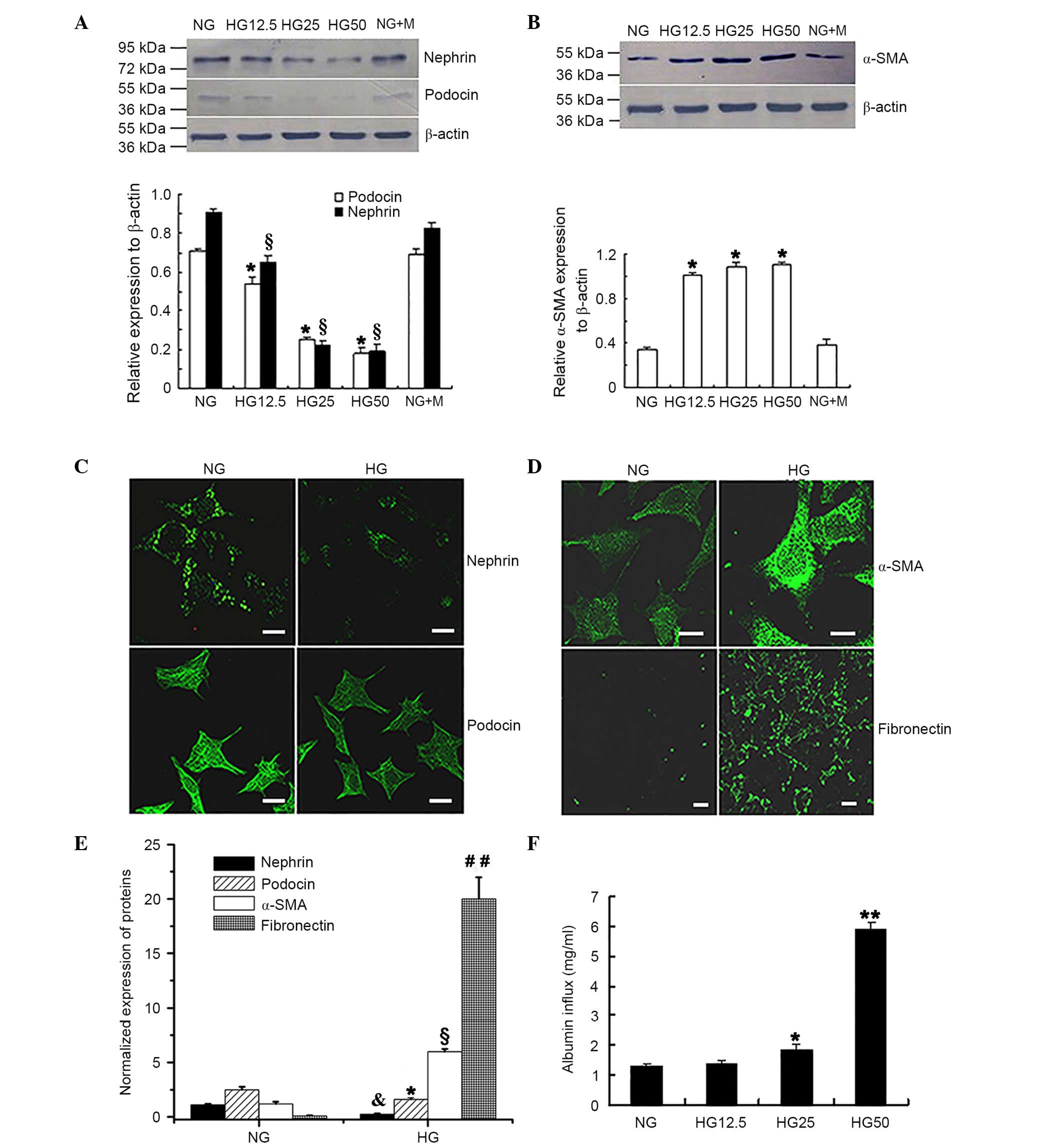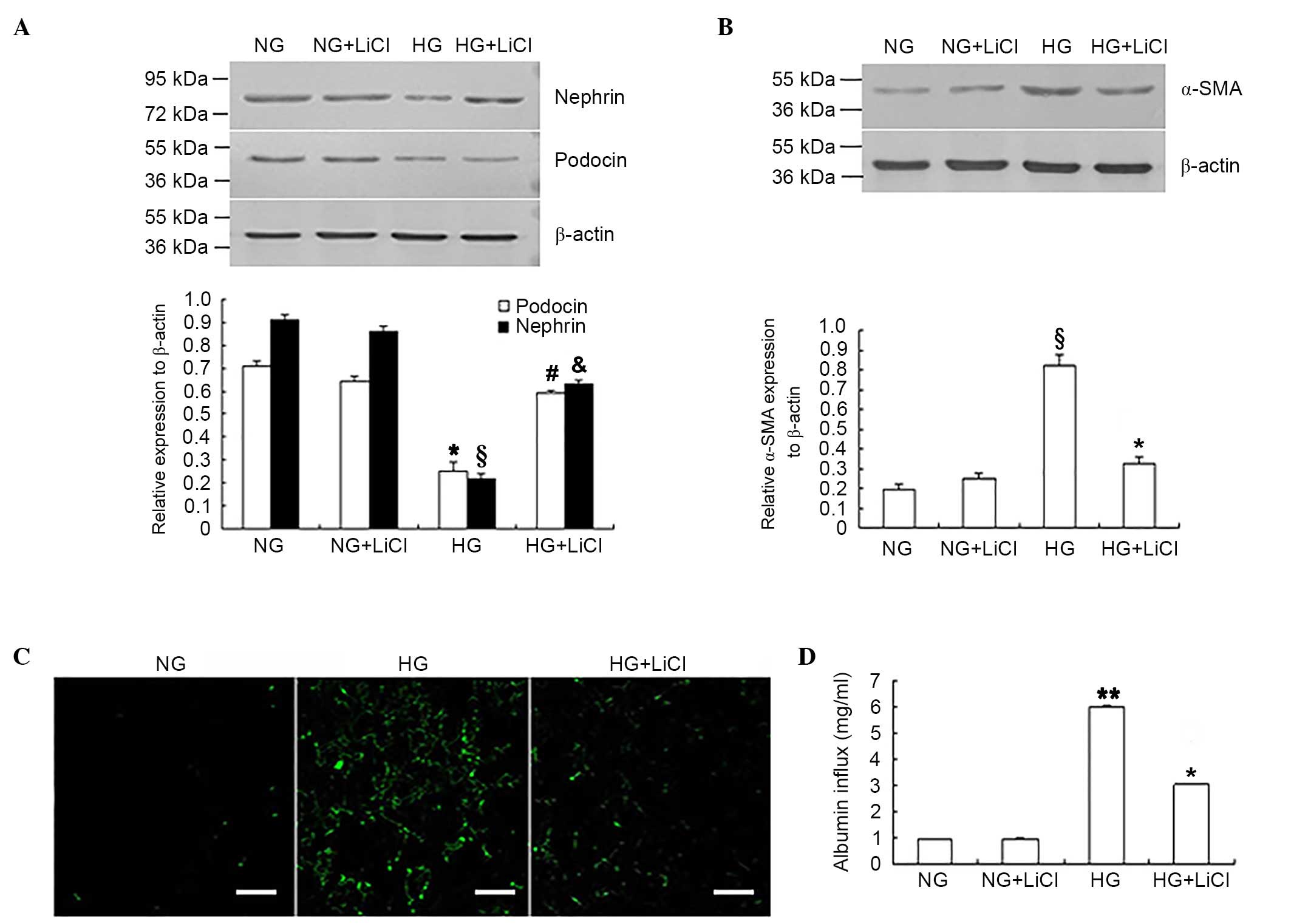|
1
|
Collins AJ, Foley RN, Chavers B,
Gilbertson D, Herzog C, Johansen K, Kasiske B, Kutner N, Liu J, St
Peter W, et al: United States renal data system 2011 annual data
report: Atlas of chronic kidney disease & end-stage renal
disease in the United States. Am J Kidney Dis. 59(1 Suppl 1). (A7):
e1–e420. 2012.
|
|
2
|
Wiggins RC: The spectrum of
podocytopathies: A unifying view of glomerular diseases. Kidney
Int. 71:1205–1214. 2007. View Article : Google Scholar : PubMed/NCBI
|
|
3
|
Juarez G Fernandez, Luño J, Barrio V, de
Vinuesa SG, Praga M, Goicoechea M, Cachofeiro V, Nieto J, Fernández
Vega F, Tato A, et al: Effect of dual blockade of the
renin-angiotensin system on the progression of type 2 diabetic
nephropathy: A randomized trial. Am J Kidney Dis. 61:211–218. 2013.
View Article : Google Scholar : PubMed/NCBI
|
|
4
|
Brenner BM, Cooper ME, de Zeeuw D, Keane
WF, Mitch WE, Parving HH, Remuzzi G, Snapinn SM, Zhang Z and
Shahinfar S: RENAAL Study Investigators: Effects of losartan on
renal and cardiovascular outcomes in patients with type 2 diabetes
and nephropathy. N Engl J Med. 345:861–869. 2001. View Article : Google Scholar : PubMed/NCBI
|
|
5
|
Soda K, Balkin DM, Ferguson SM, Paradise
S, Milosevic I, Giovedi S, Volpicelli-Daley L, Tian X, Wu Y, Ma H,
et al: Role of dynamin, synaptojanin, and endophilin in podocyte
foot processes. J Clin Invest. 122:4401–4411. 2012. View Article : Google Scholar : PubMed/NCBI
|
|
6
|
Li Y, Kang YS, Dai C, Kiss LP, Wen X and
Liu Y: Epithelial-to-mesenchymal transition is a potential pathway
leading to podocyte dysfunction and proteinuria. Am J Pathol.
172:299–308. 2008. View Article : Google Scholar : PubMed/NCBI
|
|
7
|
Jope RS, Yuskaitis CJ and Beurel E:
Glycogen synthase kinase-3 (GSK3): Inflammation, diseases, and
therapeutics. Neurochem Res. 32:577–595. 2007. View Article : Google Scholar : PubMed/NCBI
|
|
8
|
Campa VM and Kypta RM: Issues associated
with the use of phosphospecific antibodies to localise active and
inactive pools of GSK-3 in cells. Biol Direct. 6:42011. View Article : Google Scholar : PubMed/NCBI
|
|
9
|
Liu Y: New insights into
epithelial-mesenchymal transition in kidney fibrosis. J Am Soc
Nephrol. 21:212–222. 2010. View Article : Google Scholar : PubMed/NCBI
|
|
10
|
Bachelder RE, Yoon SO, Franci C, de
Herreros AG and Mercurio AM: Glycogen synthase kinase-3 is an
endogenous inhibitor of Snail transcription: Implications for the
epithelial-mesenchymal transition. J Cell Biol. 168:29–33. 2005.
View Article : Google Scholar : PubMed/NCBI
|
|
11
|
Guo J, Xia N, Yang L, Zhou S, Zhang Q,
Qiao Y and Liu Z: GSK-3β and vitamin D receptor are involved in
β-catenin and snail signaling in high glucose-induced
epithelial-mesenchymal transition of mouse podocytes. Cell Physiol
Biochem. 33:1087–1096. 2014. View Article : Google Scholar : PubMed/NCBI
|
|
12
|
Sharma K, Deelman L, Madesh M, Kurz B,
Ciccone E, Siva S, Hu T, Zhu Y, Wang L, Henning R, et al:
Involvement of transforming growth factor-beta in regulation of
calcium transients in diabetic vascular smooth muscle cells. Am J
Physiol Renal Physiol. 285:F1258–F1270. 2003. View Article : Google Scholar : PubMed/NCBI
|
|
13
|
McGowan TA, Madesh M, Zhu Y, Wang L, Russo
M, Deelman L, Henning R, Joseph S, Hajnoczky G and Sharma K:
TGF-beta-induced Ca(2+) influx involves the type III IP(3) receptor
and regulates actin cytoskeleton. Am J Physiol Renal Physiol.
282:F910–F920. 2002. View Article : Google Scholar : PubMed/NCBI
|
|
14
|
Rico M, Mukherjee A, Konieczkowski M,
Bruggeman LA, Miller RT, Khan S, Schelling JR and Sedor JR:
WT1-interacting protein and ZO-1 translocate into podocyte nuclei
after puromycin aminonucleoside treatment. Am J Physiol Renal
Physiol. 289:F431–F441. 2005. View Article : Google Scholar : PubMed/NCBI
|
|
15
|
Leeuwis JW, Nguyen TQ, Dendooven A, Kok RJ
and Goldschmeding R: Targeting podocyte-associated diseases. Adv
Drug Del Rev. 62:1325–1336. 2010. View Article : Google Scholar
|
|
16
|
Dai C, Stolz DB, Bastacky SI, St-Arnaud R,
Wu C, Dedhar S and Liu Y: Essential role of integrin-linked kinase
in podocyte biology: Bridging the integrin and slit diaphragm
signaling. J Am Soc Nephrolo. 17:2164–2175. 2006. View Article : Google Scholar
|
|
17
|
El-Aouni C, Herbach N, Blattner SM, Henger
A, Rastaldi MP, Jarad G, Miner JH, Moeller MJ, St-Arnaud R, Dedhar
S, et al: Podocyte-specific deletion of integrin-linked kinase
results in severe glomerular basement membrane alterations and
progressive glomerulosclerosis. J Am Soc Nephrolo. 17:1334–1344.
2006. View Article : Google Scholar
|
|
18
|
Lee J and Kim MS: The role of GSK3 in
glucose homeostasis and the development of insulin resistance.
Diabetes Res Clin Pract. 77:(Suppl 1). S49–S57. 2007. View Article : Google Scholar : PubMed/NCBI
|
|
19
|
Marshall SM: The podocyte: A major player
in the development of diabetic nephropathy? Horm Metab Res.
37:(Suppl 1). S9–S16. 2005. View Article : Google Scholar
|
|
20
|
Billing H, Müller D, Ruf R, Lichtenberger
A, Hildebrandt F, August C, Querfeld U and Haffner D: NPHS2
mutation associated with recurrence of proteinuria after
transplantation. Pediatr Nephrol. 19:561–564. 2004. View Article : Google Scholar : PubMed/NCBI
|
|
21
|
Hautmann MB, Adam PJ and Owens GK:
Similarities and differences in smooth muscle alpha-actin induction
by TGF-beta in smooth muscle versus non-smooth muscle cells.
Arterioscler Thromb Vasc Biol. 19:2049–2058. 1999. View Article : Google Scholar : PubMed/NCBI
|
|
22
|
Lv Z, Hu M, Zhen J, Lin J, Wang Q and Wang
R: Rac1/PAK1 signaling promotes epithelial-mesenchymal transition
of podocytes in vitro via triggering β-catenin transcriptional
activity under high glucose conditions. Int J Biochem Cell Biol.
45:255–264. 2013. View Article : Google Scholar : PubMed/NCBI
|
|
23
|
Chen T, Zheng LY, Xiao W, Gui D, Wang X
and Wang N: Emodin ameliorates high glucose induced-podocyte
epithelial-mesenchymal transition in-vitro and in-vivo. Cell
Physiol Biochem. 35:1425–1436. 2015. View Article : Google Scholar : PubMed/NCBI
|
|
24
|
Shakoori A, Ougolkov A, Yu ZW, Zhang B,
Modarressi MH, Billadeau DD, Mai M, Takahashi Y and Minamoto T:
Deregulated GSK3beta activity in colorectal cancer: Its association
with tumor cell survival and proliferation. Biochem Biophysl Res
Commun. 334:1365–1373. 2005. View Article : Google Scholar
|
|
25
|
Lin CL, Wang JY, Huang YT, Kuo YH,
Surendran K and Wang FS: Wnt/beta-catenin signaling modulates
survival of high glucose-stressed mesangial cells. J Am Soc
Nephrol. 17:2812–2820. 2006. View Article : Google Scholar : PubMed/NCBI
|
|
26
|
Paeng J, Chang JH, Lee SH, Nam BY, Kang
HY, Kim S, Oh HJ, Park JT, Han SH, Yoo TH, et al: Enhanced glycogen
synthase kinase-3β activity mediates podocyte apoptosis under
diabetic conditions. Apoptosis. 19:1678–1690. 2014. View Article : Google Scholar : PubMed/NCBI
|
|
27
|
Shang G, Tang X, Gao P, Guo F, Liu H, Zhao
Z, Chen Q, Jiang T, Zhang N and Li H: Sulforaphane attenuation of
experimental diabetic nephropathy involves GSK-3 beta/Fyn/Nrf2
signaling pathway. J Nutr Biochem. 26:596–606. 2015. View Article : Google Scholar : PubMed/NCBI
|
|
28
|
Mariappan MM, Prasad S, D'Silva K, Cedillo
E, Sataranatarajan K, Barnes JL, Choudhury GG and Kasinath BS:
Activation of glycogen synthase kinase 3β ameliorates
diabetes-induced kidney injury. J Biol Chem. 289:35363–35375. 2014.
View Article : Google Scholar : PubMed/NCBI
|


















